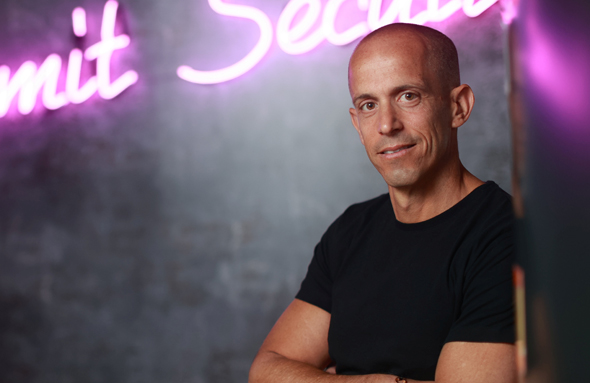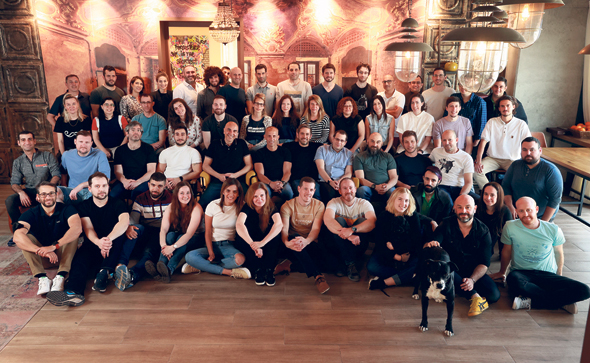The 50 Startups List
“You need a lot of willpower to reject the money being pushed on you these days”
Mickey Boodaei, the founder of Transmit Security, wants to take the burden of security off of mobile users’ hands
14:4214.04.21
Over the past year, Israeli cyber companies have become “serial fundraisers,” embarking on a new round as soon as the previous one is secured. Deviating from that model is Transmit Security, which was founded by two of the local cyber industry’s super-entrepreneurs — Mickey Boodaei and Rakesh Loonkar. Boodaei is responsible for a long list of impressive exits including Trusteer which was sold to IBM for $650 million and Imperva, which he co-founded alongside Shlomo Kramer. Loonkar has partnered with Boodaei on most of the investments he’s carried out since 2007.
 Transmit Security co-founder Mickey Boodaei. Photo: Amit Shaal “Our journey with Transmit is in many ways different than the other companies we’d been involved with in the past,” Boodaei told Calcalist. “The first explanation for that has to do with the size of the market that the company caters to. When we first launched our company, we asked ourselves which market we can turn to. The identity market (identifying users on mobile apps - M.O.) is estimated at $50 billion, but we believe it’s bigger than that and the user experience market is significantly larger. Our previous companies were nowhere near that. The market is also more accepting of fast-growing Israeli companies. In terms of our personal maturity as well, both Rakesh and I have gone through a lot in life. We’ve checked the boxes of selling companies and taking them public, but have yet to lead a giant company and that was something that was important for us on a personal level.”
Transmit Security co-founder Mickey Boodaei. Photo: Amit Shaal “Our journey with Transmit is in many ways different than the other companies we’d been involved with in the past,” Boodaei told Calcalist. “The first explanation for that has to do with the size of the market that the company caters to. When we first launched our company, we asked ourselves which market we can turn to. The identity market (identifying users on mobile apps - M.O.) is estimated at $50 billion, but we believe it’s bigger than that and the user experience market is significantly larger. Our previous companies were nowhere near that. The market is also more accepting of fast-growing Israeli companies. In terms of our personal maturity as well, both Rakesh and I have gone through a lot in life. We’ve checked the boxes of selling companies and taking them public, but have yet to lead a giant company and that was something that was important for us on a personal level.”
 Transmit Security's team. Photo: Amit Shaal Where is the company headed in terms of raising capital?
Transmit Security's team. Photo: Amit Shaal Where is the company headed in terms of raising capital?
Founded in 2014, Transmit Security, which was ranked in second place in Calcalist’s list of the 50 most promising startups for 2021, could have secured an investment from any VC that operates in the space, but aside from an initial founders’ loan, which has long since been paid back, it has raised no external capital. The company, which developed an app-free portable authenticator that uses device-based biometrics for customer authentication, has managed to generate $100 million in annual revenues, boasting a 50% growth rate. It counts major banks such as UBS, Wells Fargo, Santander, HSBC, and Israel’s Bank Leumi among its clients.
 Transmit Security co-founder Mickey Boodaei. Photo: Amit Shaal
Transmit Security co-founder Mickey Boodaei. Photo: Amit Shaal What drew you to the field of user experience?
“There is a huge gap between how companies perceive user experience on their websites and apps and what the users actually experience. The desire for higher levels of security is increasingly hurting the user experience. The poorer the user’s experience is, the worse it is for business — fewer people sign up for services and fewer people return to it because they can’t remember their passwords or are required to complete multiple stages of authentication by things like text messages or email that never arrive. We figured that there has to be another way that is more convenient for the end-users. They shouldn’t have to go through arduous processes just so organizations can be more secure. There are plenty of companies that specialize on the security side, but no one is considering the users. That is our specialty.
“We built a platform that enables organizations to design the user experience of every stage of the log-in process. We sat together with the largest organizations in the world and learned everything there is to know about user experience when it comes to security. We took that knowledge and transformed it into built-in procedures so that small companies that lack independent development capabilities can receive organized templates featuring the best possible products for opening an account, transferring funds, and enabling user authentication through simple interfaces.”
 Transmit Security's team. Photo: Amit Shaal
Transmit Security's team. Photo: Amit Shaal “At some stage, we will go public because that will be the right thing to do. I’m concerned about the market in its current form and its uncertainty. I want to build a company for the very long term and there is no need to go public now or next year, what’s important is stability that will allow the company to grow correctly. We are not short on money.”
Are SPACs an option?
“When we decide to go public it will be in the best way possible and not via a merger with a SPAC. I see the SPAC phenomena as being very opportunistic and that’s not our company’s goal. I won’t touch SPACs because I don’t want to be painted as someone who has something to hide, or can’t make it through the front door.”
How do you view the local cyber industry?
“It’s great fun to see all the activity that’s taking place in Israel and there is a lot of talent coming in and people who want to build great things, but I’m concerned that there are quite a few folks who are entering the scene with the goal of reaching an exit as quickly as possible, which sort of misses the point.
“It’s difficult to fight it and it’s only natural that many people want to take advantage of the opportunity. I just hope that people who complete their first exit then come back for a second round that is different. At the end of the day, many Israeli companies that were acquired, even for very large sums, ended up withering away within the larger organization that acquired them and that’s the sad part of the story. It’s the part of the story that people don’t often talk about. On the other hand, the state generates quite a bit of income from such acquisitions and it isn’t doing enough to ensure that there remains a sustainable industry here and that not everything be sold off after a few years.”
But you can’t ignore the incredible valuations we’ve been seeing.
“Money is being pushed in your direction and you require a lot of willpower to reject it. It’s money that fuels itself until things explode. The capital is nearly free for the taking and you can’t fault those who do. If I was in their shoes, I’d probably do the same.”



